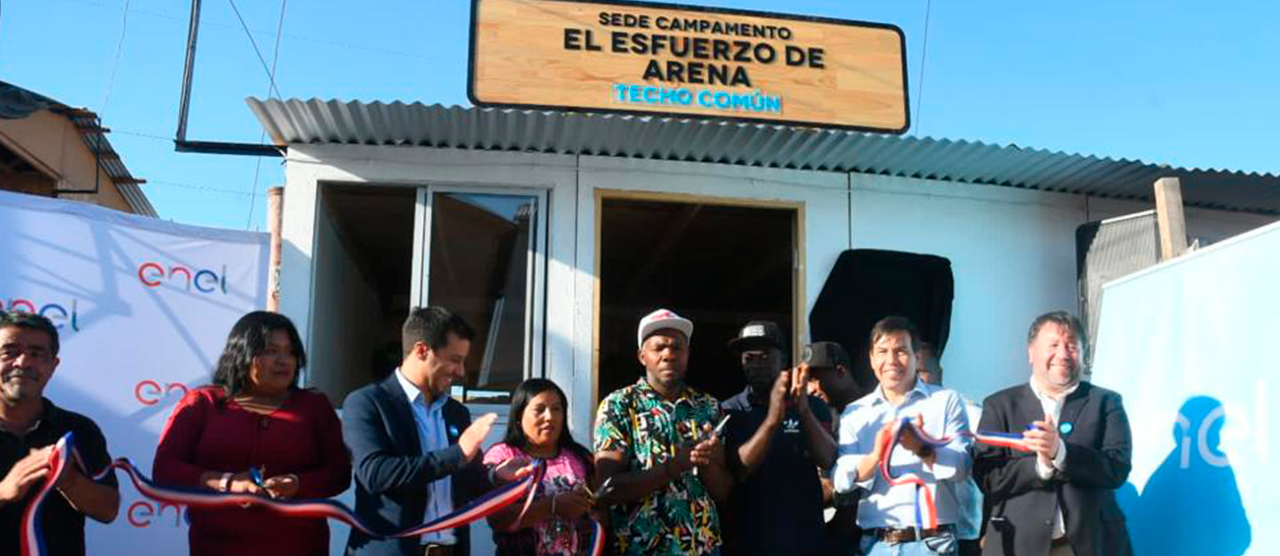
- They are neighbors of El Esfuerzo II, who also received and inaugurated a new community center to develop their projects.
- This initiative is possible thanks to a partnership between Enel Distribución and Fundación TECHO-Chile, which now allows families access to a reliable and safe electric service.
Santiago, December 8, 2022- The housing crisis in the country is a phenomenon that has been growing over the last decade, and according to data from TECHO-Chile, it has increased explosively in the previous three years. According to the latest National Cadastre of Camps 2022 of the Chilean Ministry of Housing, there are more than a thousand camps throughout Chile, most of them without safe access to essential services such as water, sewage, and electricity. Nationally, 2 out of 3 people living in camps in Chile have unsafe access to electricity.
To address this scenario, Enel Distribución and TECHO-Chile have been working for four years on the "Energy Security in Camps" program, which seeks to promote sustainable and safe access to energy through new electricity connections, through community and social support for families in these settlements.
As a result, to date, more than four thousand households in different communes of the Metropolitan Region have benefited. They have also received five sustainable community headquarters equipped with thermal insulation, efficient lighting systems, and solar panels. These spaces are open to all neighbors to promote community development, creating opportunities for meetings, exchanges, and training.
Such is the case of nearly 700 families living in the El Esfuerzo II camp in Cerrillos, who, in addition to having new electrical connections, received a new community center yesterday.
"Through the alliance that unites us with TECHO-Chile, we have designed this project that today allows us to ensure a safe connection to the electricity grid for the families that most urgently need it. We do this to keep our commitment to the community, and we hope to continue developing initiatives along the same lines, with a view to a fair energy transition", explained Víctor Tavera, general manager of Enel Distribución.
"Today, according to the estimates of our next Cadastre, more than 100,000 families live in camps, most without safe access to basic services such as water, sewage, and electricity. We can't be indifferent to this issue. We should mobilize ourselves to generate actions with determination, a sense of urgency, and above all, collaboration—allowing us to respond adequately to so many households that today face the greatest housing emergency that we have experienced as a country in decades. Initiatives like the one we have been conducting since our alliance with Enel Distribución began to point in this direction. We hope that they will be extended to more communities and generate a virtuous circle that encourages more actors to become actively and decisively involved with the problem", said Isidora Lazcano, social director of TECHO-Chile.
"As a community, we are happy and grateful. This project helps us feel much safer. We waited years to see the electrification of our houses. Today we can use our appliances and have light at any time. We are also delighted to receive the new social headquarters, where we hope to do more workshops and activities," said Diana Rojas, one of the social leaders of the camp.
Access to a reliable and safe energy service reduces the electrical risks for the community. It promotes opportunities for equal access to energy in sectors with greater energy vulnerability, with the goal that they follow the path to formal access to electricity through social support and the delivery of relevant and necessary information for the project to be sustainable.
In addition to electrification, Enel Distribución will have training spaces in the new community headquarters related to energy efficiency, electrical risk prevention, and climate change. In addition to applying social intervention initiatives related to employability that focus on installing technical tools that allow autonomy to ensure the project's sustainability over time.

